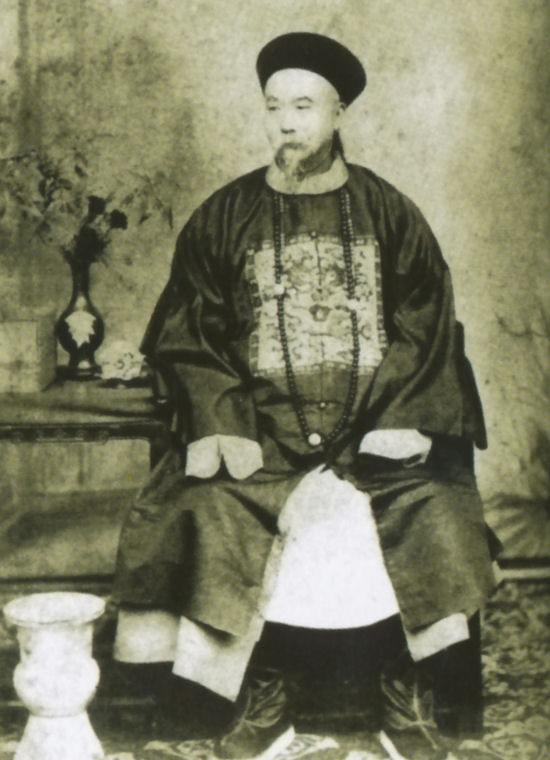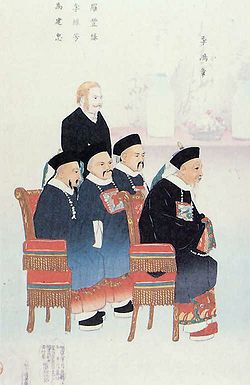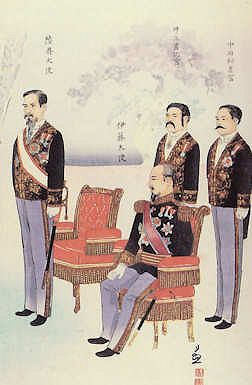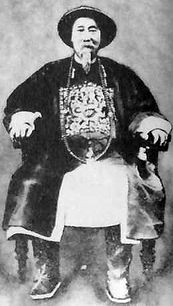Content created: 2013-03-14
File last modified:
Treaty of Shimonoseki
& The Liaotung Convention
Procursus:
This page presents the official English text of the Treaty of Shimonoseki (下関), (Chinese Mǎguān 马关 / 馬關), signed in April of 1895 after Japan defeated China in the “First Sino-Japanese War” (basically fought over China’s suzerainty over Korea, a Chinese satellite state).

China sent her premier diplomat, the venerable Lǐ Hóngzhāng 李鸿章 / 李鴻章 (right) to conduct the negotiations, but when you have lost a war you are not in a good bargaining position. The treaty forced China to abandon its claims to Korea, and to cede Taiwan and part of modern Liáoníng province 辽宁省 / 遼寧省 to Japan. A description of the circumstances of the treaty can, of course, be found on Wikipedia (link).
Added to the text on this page is the closely related “Liaotung Convention,” signed in November of the same year, after Japan was forced by a coalition of Western powers to draw back from the acquisition of territory in Liáoníng and cede it back to China (for a price).
DKJ
Reprinted from:
- CLARK, J.D.
- 1896 Formosa. Shanghai: Shanghai Mercury. Pp. 201-213.
Treaty of Shimonoseki:
Treaty of Peace Between Japan and China.
Signed at Shimonoseki (Bakan), Japan,
on the 17th April, 1895.
Ratifications Exchanged at Chefoo, China, on the 8th May, 1895,
Go directly to Liaodung Convention.
Introduction
His Majesty the Emperor of Japan, and His Majesty the Emperor of China, desiring to restore the blessings of peace to their countries, and subjects, and to remove all cause for future complications, have named as their Plenipotentiaries for the purpose of concluding a Treaty of Peace, — that is to say: —
His Majesty the Emperor of Japan,
- Count Ito Hirobumi, Junii, Grand Cross of the Imperial Order of Paullownia, Minister-President of State, and
- Viscount Mutsu Munemitsu, Junii, First Class of the Imperial Order of the Sacred Treasure, Minister of State for Foreign Affairs;
And His Majesty the Emperor of China,
- Li Hung-chang, Senior Tutor to the Heir Apparent, Senior Grand Secretary of State, Minister Superintendent of Trade for the Northern Ports of China. Viceroy of the Province of Chihli, and Earl of the First Rank, and
- Li Ching-fong. ex-Minister of the Diplomatic Service, of the Second Official Rank;
Who, after having exchanged their full powers, which were found to be in good and proper form, have agreed to the following Articles: —
Article I
Art. I. — China recognizes definitely the full and complete independence and autonomy of Corea, and, in consequence,, the payment of tribute and the performance of ceremonies and formalities by Corea to China in derogation of such independence and autonomy shall wholly cease for the future.
Article II
Art. II. — China cedes to. Japan in perpetuity and full sovereignty the following territories. together with all fortifications, arsenals, and public property thereon: —
- The Southern portion of the Province of Feng-tien, within the following boundaries —
- The line of demarcation begins at the mouth of the River Yalu, and ascends that stream to the mouth of the River Anping; from thence the line runs to Fenghuang ; from thence to Haicheng ; from thence to Yingkow, forming a line which describes the Southern portion of the territory. The places above named are included in the ceded territory. When the line reaches the River Liao at Yingkow it follows the course of that stream to its mouth, where it. terminates. The mid-channel of the River Liao shall be, taken as the line of demarcation.
- This cession also includes all Islands appertaining or belonging to the Province of Feng-tien situated in the eastern portion of the Bay of Liaotung, and in the northern part of the Yellow Sea. [Fèngtiān Province 奉天省, roughly corresponding with modern Liáoníng 辽宁省/遼寧省 was one of the “Three Manchurian Provinces” during the Qīng or Manchu dynasty. DKJ]
- The Island of Formosa, together with all islands appertaining or belonging to the said Island of Formosa.
- The Pescadores Group, — that is to say, all Islands lying between the 119th and 120th degrees of longitude east of Greenwich and the 23rd and 24th degrees of north latitude. [The Pescadores correspond to modern Pénghú Xiàn 澎湖县/澎湖縣, part of modern Taiwan. DKJ]
Return to top.
Article III

Art. III. — The alignments of the frontiers described in the preceding Article, and shown on The annexed map, shall he subject to verification and demarcation on the spot by a Joint Commission of Delimitation, consisting of two or more Japanese and two or more Chinese Delegates, to be appointed immediately after the exchange of the ratifications of this Act. In case the boundaries laid down in this Act are found to be defective at any point, either on account of topography or in consideration of good administration, it shall also be the duty of the Delimitation Commission to rectify the same.
The Delimitation Commission will enter upon its duties as soon as possible, and will bring its labours to a conclusion within the period of one year after appointment.
The alignments laid down in this Act shall, however, be maintained until the rectifications of the Delimitation Commission, if any are made, shall have received the approval of the Governments of Japan and China.
Article IV
Art. IV. — China agrees to pay to Japan as a war indemnity the sum 200,060,000 Kuping taels. The said sum to be paid in eight instalments The first instalment of 50,000,000 taels to be paid within six months, and the second instalment of 50,000,000 taels to be paid within twelve months after the exchange of the ratifications of this Act. The remaining sum to be paid in six equal annual instalments as follows: the first of such equal annual instalments to be paid within two years, the second within three years, the third within four years, the fourth within five years, the fifth within six years, and the sixth within seven years, after the exchange of the ratifications of this Act. Interest at the rate of 5 per cent. per annum shall begin to run on all unpaid portions of the said indemnity from the date the first instalment falls due.
China shall, however, have the right to pay by anticipation at any time any or all of said instalments. In case the whole amount of the said indemnity is paid within three years after the exchange of the ratifications of the present Act, all interest shall be waived and the interest for two years and a-half, or for any less period if then already paid, shall be included as a part of the principal amount of the indemnity.
Article V
Art. V. — The inhabitants of the territories ceded to Japan who wish to take up their residence outside the ceded districts shall be at liberty to sell their real property and retire. For this purpose a period of two years from the date of the exchange of the ratifications of the present Act shall be granted. At the expiration of that period those of the inhabitants who shall not have left such territories shall, at the option of Japan, be deemed to be Japanese subjects.
Each of the two Governments shall, immediately upon the exchange of the ratifications of the present Act, send one or more Commissioners to Formosa to effect a final transfer of that province, and within the space of two months after the exchange of the ratifications of this Act such transfer shall be completed.
Article VI
Art. VI. — All Treaties between Japan and China. having come to an end in consequence of war, China engages, immediately upon the exchange of the ratifications of this Act, to appoint Plenipotentiaries to conclude with the Japanese Plenipotentiaries a Treaty of Commerce and Navigation, and a Convention to regulate frontier intercourse and trade. The Treaties, Conventions, and Regulations, now subsisting between China and European Powers shall serve as a basis for the said Treaty and Convention between Japan and China. From the date of the exchange of the ratifications of this Act until the said Treaty and Convention are brought into actual operation the Japanese Government, its officials, commerce, navigation, frontier intercourse and trade, industries, ships and subjects, shall in every respect be accorded by China most favoured-nation treatment.
China makes, in addition, the following concessions, to take effect six months after the date of the present Act: —

- The following cities, towns, and ports, in addition to those already opened, shall be opened to the trade, residence, industries, and manufactures of Japanese subjects, under the same conditions, and with the same privileges and facilities as exist at the present open cities, towns, and ports of China.
- Shashi, in the Province of Hupeh.
- Chungking, in the Province of Szechuan.
- Soochow, in the Province of Kiangsu.
- Hangchow, in the Province of Chekiang.
The Japanese Government shall have the right to station Consuls at any or all of the above-named places.
- Steam navigation for vessels under the Japanese flag for the conveyance of passengers and cargo shall be extended to the following places: —
- On the Upper Yangtze River, from Ichang to Chungking.
- On the Woosung River, and the Canal, from Shanghai to Soochow and Hangchow.
The Rules and Regulations which now govern the navigation of the inland waters of China by foreign vessels shall, so far as applicable, be enforced in respect of the above-named routes until new Rules and Regulations are conjointly agreed to.
- Japanese subjects purchasing goods or produce in the interior of China, or transporting imported merchandize into the interior of China, shall have the right temporarily to rent or hire warehouses for the storage of the articles so purchased or transported, without the payment of any taxes or exaction whatever.
- Japanese subjects shall be free to engage in all kinds of manufacturing industries in all the open cities, towns, and ports of China, and shall be at liberty to import into China all kinds of machinery, paying only the stipulated import duties thereon.
All articles manufactured by Japanese subjects in China, shall in respect of inland transit and internal taxes, duties, charges, and exactions of all kinds and also in respect of warehousing and storage facilities in the interior of China, stand upon the same footing and enjoy the same privileges and exemptions as merchandize imported by Japanese subjects into China.
In the event additional Rules and Regulations are necessary in connection with these concessions, they shall be embodied in the Treaty of Commerce and Navigation provided for by this Article.
Return to top.
Article VII
Art. VII. — Subject to the provisions of the next succeeding Article, the evacuation of China by the armies of Japan shall be completely effected within three months after the exchange of the ratifications of the present Act.
Article VIII
Art. VIII. — As a guarantee of the faithful performance of the stipulations of this Act, China consents to the temporary occupation by the military forces of Japan, of Wei-hai-wei, in the Province of Shantung.
Upon the payment of the first two instalments of the war indemnity herein stipulated for and the exchange of the ratifications of the Treaty of Commerce and Navigation, the said place shall be evacuated by the Japanese forces, provided the Chinese Government consents to pledge, under suitable and sufficient arrangements, the Customs Revenue of China as security for the payment of the principal and interest of the remaining instalments of said indemnity. In the event no such arrangements are concluded, such evacuation shall only take place upon the payment of the final installment of said indemnity.
It is, however, expressly understood that no such evacuation shall take place until after the exchange of the ratification of Treaty of Commerce and Navigation.
Article IX
Art. IX — Immediately upon the exchange of the ratifications of this Act, all prisoners of war then held shall be restored, and China undertakes not to ill-treat or punish prisoners of war so restored to her by Japan. China also engages to at once release all Japanese subjects accused of being military spies or charged with any other military offences. China further engages not to punish in any manner, nor to allow to be punished, those Chinese subjects who have in any manner been compromised in their relations with the Japanese army during the war.
Article X
Art. X. — All offensive military operations shall cease upon the exchange of the ratifications of this Act.
Article XI
Art. XI. — The present Act shall be ratified by their Majesties the Emperor of. Japan and the Emperor of China, and the ratifications shall be exchanged at Chefoo on the 8th day of the 5th month of the 28th year of Meiji, corresponding to 14th day of the 4th month of 21 st year of Kuang Hsü.
Closing
In witness whereof, the respective Plenipotentiaries have signed the same and have affixed thereto the seal of their arms.
Done at Shimonoseki, in duplicate, this 17th day of 4th month of the 28th year of Meiji, corresponding to 23rd of the 3rd month of the 21st year of Kuang Hsü.

(L.S.) Count ITO HIROBUMI, Junii, Grand Cross of the Imperial Order of Paullownia, Minister-President of State, Plenipotentiary of His Majesty the Emperor of Japan.
(L.S.) Viscount MUTSU MUNEMITSU, Junii, First Class of the Imperial Order of the Sacred Treasure, Minister of State for Foreign Affairs, Plenipotentiary of His Majesty the Emperor of Japan.
(L.S.) LI HUNG-CHANG, Plenipotentiary of His Majesty the Emperor of China, Senior Tutor to the Heir Apparent, Senior Grand Secretary of Northern Ports of China, Viceroy of the Province of Chihli, and Earl of the First Rank.
(LS.) LI CHING-FONG, Plenipotentiary of His Majesty the Emperor of China, Ex-Minister of the Diplomatic Service, of the Second Official Rank.
Return to top.
The Liaotung Convention
Signed at Peking, 8th November, 1895.
Preface
His Majesty the Emperor of China and His Majesty the Emperor of Japan, desiring to conclude a Convention for the retrocession by Japan of all of the Southern portion of the province of Feng-tien to the sovereignty of China, have for that purpose named as their Plenipotentiaries, that is to say: —
His Majesty the Emperor of China, Li Hung-chang, Minister Plenipotentiary, Senior Tutor of the Heir Apparent, Senior Grand Secretary of State and Earl of the First Rank, and His Majesty the Emperor of Japan, Baron Hayashi Tadasu, Shoshü Grand Cross of the Imperial Order of the Sacred Treasure, Grand Officer of the Imperial Order of the Rising Sun, Minister Plenipotentiary and Envoy Extraordinary; who, after having communicated to each other their Full Powers, which were found to be in good and proper form, have agreed upon the following Articles: —
Article I
Art. I. — Japan retrocedes to China in perpetuity and full sovereignty the Southern portion of the province of Feng-tien, which was ceded to Japan under Article II. of the Treaty of Shimonoskei on the 23rd day of the 3rd month of the 21st year of Kuang Hsü, corresponding to the 17th day of the 4th month of the 28th year of Meiji, together with all fortifications, arsenals, and public property thereon at the time the retroceded territory is completely evacuated by the Japanese forces in accordance with the provisions of Article III. of this Convention, — that is to say, the Southern portion of the province of Feng-tien from the mouth of the. River Yalu to the mouth of the River Anping, thence to Fenghuang-ch'en, thence to Haich'eng and thence to Yingkow; also all cities and towns to the south of this boundary and all islands appertaining or belonging to the province of Feng-tien situated in the Eastern portion of the Bay of Liaotung and in the Northern part of the Yellow Sea. Article III. of the Treaty of Shimonoseki is in consequence suppressed, as are also the provisions in the same Treaty with reference to the conclusion of a Convention to regulate frontier intercourse and trade.
Article II
Art. II. — As compensation for the Southern portion of the province of Feng-tien, the Chinese Government engage to pay to the Japanese Government 30,000,000 Kuping Taels on or before the 30th day of the 9th month of the 21st year of Kuang Hsü, corresponding to the 16th day of the 11th month of the 28th year of Meiji (November, 16th, 1895):
Article III
Art. III. — Within three months from the day on which China shall have paid to Japan the compensatory indemnity of 30,000,000 Kuping Taels provided for in Article II. of this Convention, the retroceded territory shall be completely evacuated by the Japanese forces.
Article IV
Art. IV. — China engages not to punish in any manner nor to allow to be punished those Chinese subjects who have in any manner been compromised in connection with the occupation by the Japanese forces of the retroceded territory.
Article V
Art. V. — The present Convention is signed in duplicate in the Chinese, Japanese, and English languages. All these texts have the same meaning and intention, but in case of any differences of interpretation between the Chinese and Japanese texts, such differences shall be decided by reference to the English text.
Article VI
Art. VI. — The present Convention shall be ratified by His Majesty the Emperor of China and His Majesty the Emperor of Japan and the ratifications thereof shall be exchanged at Peking within twenty-one days from the present date.
Closing
In witness whereof the respective Plenipotentiaries have signed the same and have affixed thereto the seals of their arms.
Done at Peking this 22nd day of the 9th month of the 21st year of Kuang Hsü, corresponding to the 8th of the 11th month of the 28th year of Meiji (November 8th, 1895).
[L.S.] LI HUNG-CHANG.
[L.S.] BARON HAYASHI TADASU.
Return to top.



